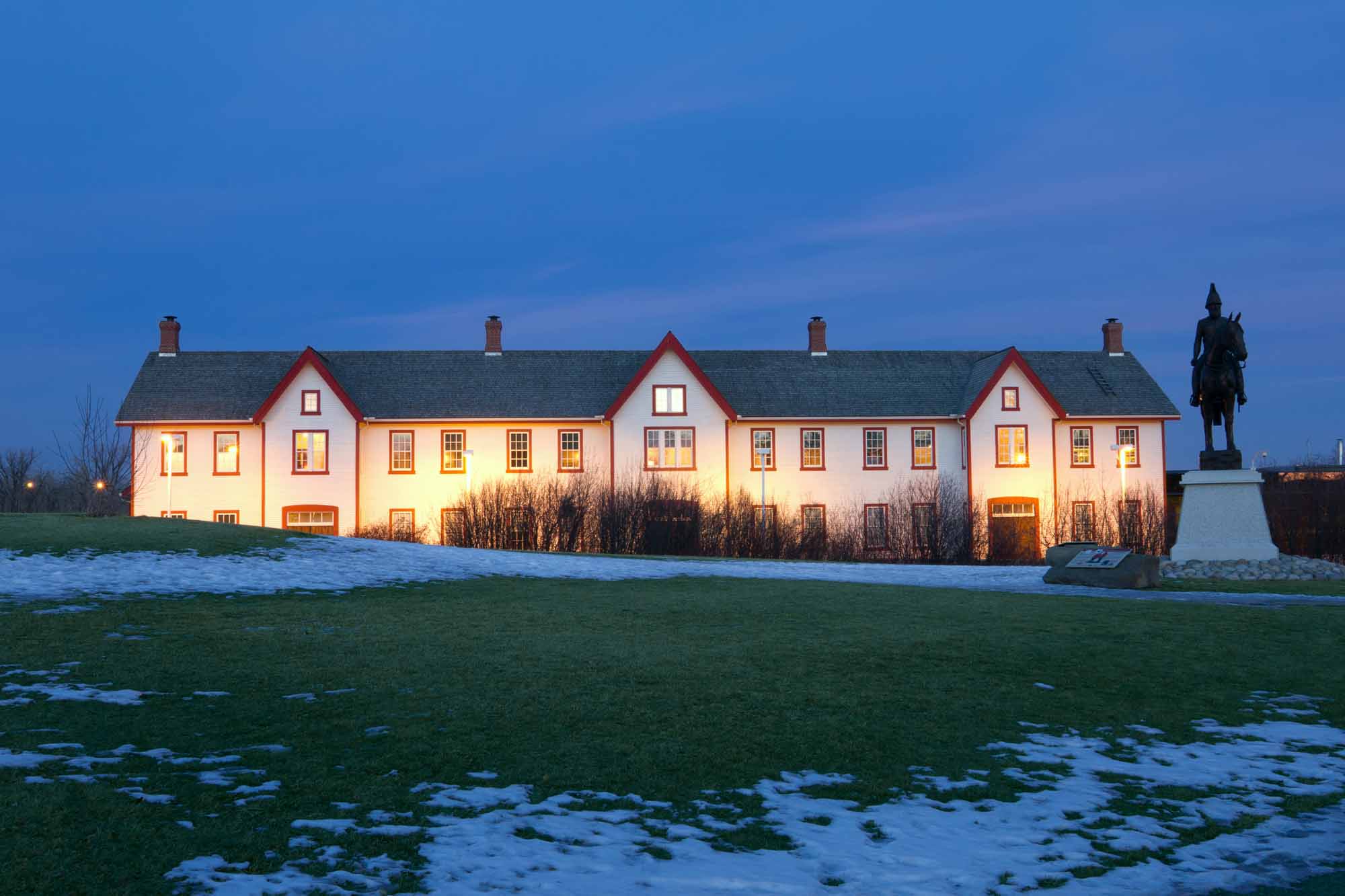Browse "National historic sites"
-
Article
Notre-Dame de Québec Cathedral-Basilica
Notre-Dame de Québec is a cathedral-basilica with primatial status, being the mother church of a primate of the Catholic Church in Canada, in this case the Archbishop of Québec.
"https://d2ttikhf7xbzbs.cloudfront.net/media/media/6a73eb44-33c1-41c9-9e6f-4d4f853b2e7e.jpg" // resources/views/front/categories/view.blade.php
https://d2ttikhf7xbzbs.cloudfront.net/media/media/6a73eb44-33c1-41c9-9e6f-4d4f853b2e7e.jpg
-
Article
Craigflower Manor and Schoolhouse
The Craigflower Manor (1856) and Schoolhouse (1855) were built by the Puget's Sound Agricultural Company, a subsidiary of the Hudson’s Bay Company (HBC). Both the manor and schoolhouse national historic sites located near Victoria, British Columbia.
"https://d2ttikhf7xbzbs.cloudfront.net/Craigflower/Craigflower_Manor_House.jpg" // resources/views/front/categories/view.blade.php
https://d2ttikhf7xbzbs.cloudfront.net/Craigflower/Craigflower_Manor_House.jpg
-
Article
Distillery Historic District / Gooderham & Worts National Historic Site
In 1832, English immigrants and brothers-in-law James Worts and William Gooderham built a 22-metre brick windmill on the edge of Toronto Bay that soon became a symbol of the young city.
"https://d2ttikhf7xbzbs.cloudfront.net/media/media/30c24516-9c51-4a8a-9d32-3851f149973c.jpg" // resources/views/front/categories/view.blade.php
https://d2ttikhf7xbzbs.cloudfront.net/media/media/30c24516-9c51-4a8a-9d32-3851f149973c.jpg
-
Article
Fort Amherst
Fort Amherst, on the west shore of Charlottetown Harbour, Prince Edward Island, was built in late 1758 by the British. The site was known previously as Port La Joie, established in 1720 as the capital of the French colony of Île Saint-Jean.
"https://development.thecanadianencyclopedia.ca/images/tce_placeholder.jpg?v=e9dca980c9bdb3aa11e832e7ea94f5d9" // resources/views/front/categories/view.blade.php
https://development.thecanadianencyclopedia.ca/images/tce_placeholder.jpg?v=e9dca980c9bdb3aa11e832e7ea94f5d9
-
Article
Fort Anne
For the next 40 years, the British at Fort Anne maintained a precarious position in the Acadian-dominated province and were frequently attacked by French and Indigenou raiding parties. The status of the fort declined with the founding of Halifax (1749) and the expulsion of the Acadians (1755).
"https://d2ttikhf7xbzbs.cloudfront.net/media/media/8cd2ef08-9dc5-4094-8da3-129abfe25600.jpg" // resources/views/front/categories/view.blade.php
https://d2ttikhf7xbzbs.cloudfront.net/media/media/8cd2ef08-9dc5-4094-8da3-129abfe25600.jpg
-
Article
Fort Battleford
When the settlement of Battleford, in what is now west-central Saskatchewan, was named the capital of the North-West Territories in 1876, the North-West Mounted Police established a post to deal with anticipated problems with Indigenous people.
"https://development.thecanadianencyclopedia.ca/images/tce_placeholder.jpg?v=e9dca980c9bdb3aa11e832e7ea94f5d9" // resources/views/front/categories/view.blade.php
https://development.thecanadianencyclopedia.ca/images/tce_placeholder.jpg?v=e9dca980c9bdb3aa11e832e7ea94f5d9
-
Article
Fort Beauséjour
Fort Beauséjour, on the west bank of the Missaguash River near present-day Sackville, New Brunswick was built 1751-55 by the French as a counter to nearby British Fort Lawrence (near Amherst, NS).
"https://development.thecanadianencyclopedia.ca/images/tce_placeholder.jpg?v=e9dca980c9bdb3aa11e832e7ea94f5d9" // resources/views/front/categories/view.blade.php
https://development.thecanadianencyclopedia.ca/images/tce_placeholder.jpg?v=e9dca980c9bdb3aa11e832e7ea94f5d9
-
Article
Fort Calgary
Fort Calgary is located at the junction of the Bow and Elbow rivers on the site of the present-day city of Calgary. It was established in 1875 as a post of the North-West Mounted Police. In 1925, Fort Calgary was designated a National Historic Site.
"https://d2ttikhf7xbzbs.cloudfront.net/media/media/e05805b7-fc65-443a-9f50-fbcf53aac66c.jpg" // resources/views/front/categories/view.blade.php
https://d2ttikhf7xbzbs.cloudfront.net/media/media/e05805b7-fc65-443a-9f50-fbcf53aac66c.jpg
-
Article
Fort Carlton
Fort Carlton, situated on the south branch of the North Saskatchewan River near Duck Lake (Saskatchewan), was established in 1810 as a Hudson's Bay Company fur trade and provision post.
"https://development.thecanadianencyclopedia.ca/images/tce_placeholder.jpg?v=e9dca980c9bdb3aa11e832e7ea94f5d9" // resources/views/front/categories/view.blade.php
https://development.thecanadianencyclopedia.ca/images/tce_placeholder.jpg?v=e9dca980c9bdb3aa11e832e7ea94f5d9
-
Article
Fort Chambly
In 1813, during the WAR OF 1812, construction of a vast military complex was undertaken. Insufficient maintenance reduced Chambly to a dilapidated condition, and it was abandoned in 1851. Private restoration in 1882-83 preserved the site, which became Fort Chambly National Historic Park in 1921.
"https://d2ttikhf7xbzbs.cloudfront.net/media/media/f449a69c-459a-4c23-b187-211f7516157b.jpg" // resources/views/front/categories/view.blade.php
https://d2ttikhf7xbzbs.cloudfront.net/media/media/f449a69c-459a-4c23-b187-211f7516157b.jpg
-
"https://development.thecanadianencyclopedia.ca/images/tce_placeholder.jpg?v=e9dca980c9bdb3aa11e832e7ea94f5d9" // resources/views/front/categories/view.blade.php
https://development.thecanadianencyclopedia.ca/images/tce_placeholder.jpg?v=e9dca980c9bdb3aa11e832e7ea94f5d9
-
Article
Fort Duquesne
Fort Duquesne, located at the confluence of the Allegheny and Monongahela Rivers at the site of present-day Pittsburgh, Penn, guarded the most important strategic location in the west at the time of the Seven Years' War.
"https://development.thecanadianencyclopedia.ca/images/tce_placeholder.jpg?v=e9dca980c9bdb3aa11e832e7ea94f5d9" // resources/views/front/categories/view.blade.php
https://development.thecanadianencyclopedia.ca/images/tce_placeholder.jpg?v=e9dca980c9bdb3aa11e832e7ea94f5d9
-
Article
Fort Edmonton
Fort Edmonton was established on the Northern Saskatchewan River in 1795 by the Hudson's Bay Company as a fortified trading post next to the rival North West Company, which had earlier built its own fort nearby.
"https://d2ttikhf7xbzbs.cloudfront.net/media/media/59b16b11-e6be-4cf9-812f-126f5a933c3f.jpg" // resources/views/front/categories/view.blade.php
https://d2ttikhf7xbzbs.cloudfront.net/media/media/59b16b11-e6be-4cf9-812f-126f5a933c3f.jpg
-
Article
Fort Ellice
Fort Ellice was a Hudson's Bay Company trading post located on Beaver Creek near the confluence of the Assiniboine and Qu'Appelle rivers, just east of the present-day Manitoba-Saskatchewan border. Established in 1831 by C.T.
"https://development.thecanadianencyclopedia.ca/images/tce_placeholder.jpg?v=e9dca980c9bdb3aa11e832e7ea94f5d9" // resources/views/front/categories/view.blade.php
https://development.thecanadianencyclopedia.ca/images/tce_placeholder.jpg?v=e9dca980c9bdb3aa11e832e7ea94f5d9
-
Article
Fort Erie National Historic Site of Canada
Fort Erie National Historic Site recognizes a particularly strategic site during the War of 1812 at the entrance to the Niagara River from Lake Erie at the southeast corner of the Niagara Peninsula.
"https://development.thecanadianencyclopedia.ca/images/tce_placeholder.jpg?v=e9dca980c9bdb3aa11e832e7ea94f5d9" // resources/views/front/categories/view.blade.php
https://development.thecanadianencyclopedia.ca/images/tce_placeholder.jpg?v=e9dca980c9bdb3aa11e832e7ea94f5d9
